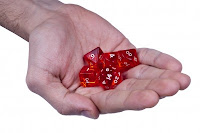How to write for role-playing games
It didn't take long for the video game industry to cotton-on
to the fact that the key to a great game is a great narrative. Sure, gameplay
and cool characters are key, but as any creative writer will tell you, if you want
to keep someone hooked to the bitter end it's your narrative that will do it.
This is something that the tabletop role-playing game
industry has understood for a long while. It's narrative that keeps you in
business. It's narrative that keeps people buying – and playing – your games.
But that isn't enough to explain the longevity of the RGP industry, particularly
in the face of progressively more immersive and narrative-driven video games.
So what is it?
It's the very thing that makes good writing for role-playing
games so very difficult. It's the opportunity for the participants to play the
hero, to be the characters in their very own story – to be immersed in the
story events and to effect a change in them. And there lies the problem for the
writer writing for RPGs. Who the hell can write a great story without any
characters to populate it?
The wrong way to do it is insist that the players run
pre-generated characters and rail-road them through a fixed narrative defined
in your text. While this might provide a narrative that's great to read, it
certainly won't provide one that's great to play. A story-narrative that allows
no room for the players to manoeuvre is
no good for a role-playing game.
Here are the right ways to do it.
Let the characters witness someone else's story
Some of the greatest modern novels have main characters who
are witnessing someone else's story (Nick Carraway in The Great Gatsby, The
Chief in One Flew Over the Cuckoo's Nest) and this provides an excellent model
for writing a role-play scenario. If you write a story happening to some NPCs
(non-player characters) that are closely connected to the player-characters the
players will get drawn into that story and become part of it. The fact that you
have scripted the story that will happen does not mean that the players cannot
impact and change that story. In fact, this is the most likely set-up i.e. a
bad thing will happen to the NPC(s) if the players don't get involved and
change the course of events. This is a great technique for writing a strong
narrative that the players can react to and change, thereby providing freedom
of action for the players and yet still allowing the writer to deliver a strong
narrative for the scenario.
Let the characters uncover an existing story
This model is the classic ' detective' story. The writer
constructs a narrative that has already occurred and it's up to the players to
discover what that story is. The trick for the writer here is to write the
story i.e. the one that will be discovered by the players – then provide a hook
and a trail of clues for the players to follow that gradually reveal the
underlying story. This is no easy feat for the writer – but then writing never
is. The discovery of the clues and how the players react to them is a story in
itself, (which afterall is the whole point - see next section), but it sits on
a strong and interesting narrative that provides the back-bone for the
front-story of the players.
Let the characters be the story
This is really what everyone is trying to achieve with a
role-playing game – a great story created by the players through the characters
they have created. This puts a lot more responsibility on the gamesmaster and
the players than on the writer (think of a director and actors devising their
own piece of theatre rather than working with a text). The work of the writer
here is to create interesting and motivated NPCs, stimulating and detailed
settings and environments, set-pieces and sub-plots – all of which are provided
for the players to create and weave their own story around. Although rather
limited in scope this is what the early Dungeons and Dragons scenarios were
like (kill monster, find treasure) in that they didn't prescribe a narrative
for the players – they had to forge their own.
All of the above
In truth, a great role-play scenario will have all of the
above elements within it – narratives to reveal and witness, but most of all one
created by the players using the elements provided by the writer.



thanks for sharing the writing skills~
ReplyDeleteRegards,
http://www.lonelyreload.com (A Growing Teenager Diary) ..